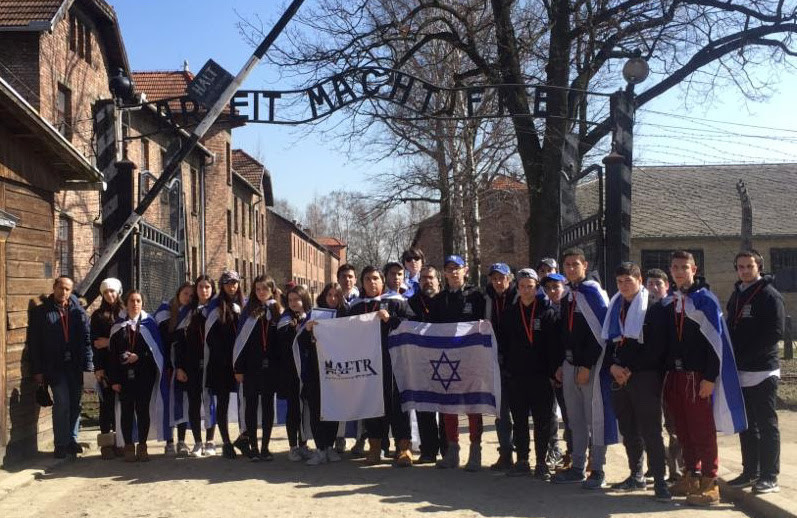HAFTR students back from Poland
During the last wees of March, 19 HAFTR seniors had the opportunity to participate in a life-changing mission to Poland, and I was fortunate enough to be one of those students. On this trip, we learned about Jewish life before WWII, walked through concentration camps and villages that were destroyed by the Nazis, and visited kevarim of kedoshim.
Each of us learned what it means to be Jewish and internalized those experiences in our own ways. This opportunity allowed me to finally be able to see what four of my great-grandparents and their families went through. Walking through the camps with the Israeli flag waving on my back was an indescribable feeling. I was able to prove that no matter how hard others may try to destroy the Jewish people, we never perish, and will always remain strong.
After traveling to Poland, it has now become the mission of the participants to pass on the things we saw to other students and faculty members. On Yom April 24, HAFTR High School’s Yom HaShoah program started with an opening speech from Rabbi Gedaliah Oppen, principal of Judaic Studies, who led the mission, followed by students’ testimonies and candle lightings, to symbolize the mourning of the six million Jews who were brutally murdered in the Holocaust.
Michal Engel, one of the students who participated in the Poland trip, captured the mission perfectly through her video which not only to re-inspired the mission participants, but also sparked something within everyone who watched it.
In addition to the students’ presentation, we had the privilege and honor of hearing Irene Hizme speak and share her story. Hizme, a HAFTR grandparent and Hebrew Institute of Long Island alumna, is a survivor of the Auschwitz concentration camp. Both she and her twin brother were experimented on by Dr. Josef Mengele.
Hizme and her brother, Rene, were used as human guinea pigs as Mengele performed organ transplants and blood transfusions on his “patients.” Of 3,000 twins who were victims of Mengele’s experiments, only 160 survived.
She went into detail about what her life and experiences were like before, during, and after the war, sharing a handful of personal stories from her time as a child. Hizme was only six when she and her brother were torn from their mother’s arms, which was the last time she ever saw her parents.
Her message was to never to forget the atrocities of the Holocaust, to never be silent in the face of evil, and to carry on proudly as Jews. We owe it to Hizme, our ancestors, and the six million who perished to take time out of our lives to remember them and to never forget.

 54.0°,
Mostly Cloudy
54.0°,
Mostly Cloudy 




